非谓语动词---不定式
非谓语动词——不定式
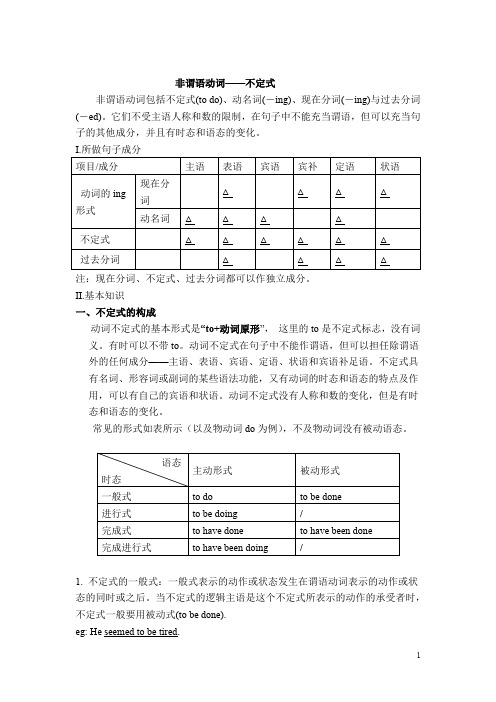
非谓语动词——不定式非谓语动词包括不定式(to do)、动名词(-ing)、现在分词(-ing)与过去分词(-ed)。
它们不受主语人称和数的限制,在句子中不能充当谓语,但可以充当句子的其他成分,并且有时态和语态的变化。
注:现在分词、不定式、过去分词都可以作独立成分。
II.基本知识一、不定式的构成动词不定式的基本形式是“to+动词原形”,这里的to是不定式标志,没有词义。
有时可以不带to。
动词不定式在句子中不能作谓语,但可以担任除谓语外的任何成分——主语、表语、宾语、定语、状语和宾语补足语。
不定式具有名词、形容词或副词的某些语法功能,又有动词的时态和语态的特点及作用,可以有自己的宾语和状语。
动词不定式没有人称和数的变化,但是有时态和语态的变化。
常见的形式如表所示(以及物动词do为例),不及物动词没有被动语态。
1. 不定式的一般式:一般式表示的动作或状态发生在谓语动词表示的动作或状态的同时或之后。
当不定式的逻辑主语是这个不定式所表示的动作的承受者时,不定式一般要用被动式(to be done).eg: He seemed to be tired.The building to be finished next month is for our teachers.2. 不定式的进行式:进行式表示动作正在进行,与谓语的动作同时发生。
e.g. When I went to his home, he happened to be traveling around the world.3. 不定式的完成式:如果不定式所表示的动作或状态发生在谓语动词所表示动作或状态之前,就用完成式;若是在此基础上的被动含义,就用完成被动式( to have been done).e.g. He is said to have written a novel about the Long March.He is said to have been taught French when he was a child.4. 不定式的完成进行式:如果不定式的动作是在谓语所表示的时间之前一直在进行或有可能继续进行的动作,就要用完成进行式.eg. We’re happy to have been working with the experts all the month.二、不定式的用法:1. 动词不定式做主语:不定式做主语一般表示具体的某次动作。
非谓语动词之动词不定式

四、动词不定式用作宾语补足语。
常见的动词有:
ask, tell, get, want, like, hate, prefer; (1)se老e, 师hea叫r,我wa们tc努h, 力no学tic习e, 英fee语l; 。
Tmhaektee,alceht,erhealspked us __to___ __w_o_r_k__ __h_a_r_d__ at English.
3)老师教我们怎样学习英语。 The teacher teaches us __h_o_w__ __t_o___ __l_e_a_rn__ English.
4)你能决定到哪里去? Can you decide __w_h_e_r_e__ ___t_o___ ___g_o____?
特殊疑问词 + 动词不定式 结构实际上是宾语从句的简化。 由复合句向简单句转化。 1. Can you tell me when we will start?
tell, show, teach, decide, learn等动词常用一 个带连接词的不定式作宾语。
1)你能告诉我什么时候出发? Can you tell me __w_h_e_n___ ___to_____ __st_a_r_t ___?
2)她教我们如何种植树木。 She showed us __h_o_w__ __t_o__ __p_la_n_t the trees.
(1)我看见她关门。
I sawsheiemsb__d_o_c_sl_oth_se___ t看he见do某or. 人做某事
(4)ha我te更sb喜to欢do你s关th 电视讨。厌某人做某事 Ipprreeffeerrsybotuo_d_ot_os_t_h_ 更_t_u加_r_n喜__欢_ _某_o_人f_f_做_ 某th事e TV.
非谓语动词---不定式

非谓语动词一不定式原形动词前加to,构成动词不定式。
不定式不做谓语,属非谓语动词。
第一节不定式的时态和语态一、不定式的时态1、时态的构成不定式常用的时态有:一般式,完成式和进行式。
其构成见表(以do为例):2、时态的用法(1)一般式的使用范围①不定式所示动作或状态与谓语动词所示的动作或状态同时或几乎同时发生或存在,用一般式,如:I am glad to see you.高兴见到你。
I saw her enter the room just now.。
我刚见他进房间去了。
②不定式所示动作或状态发生在谓语动词所示动作或状态之后,也用一般式,如:My uncle asked me to see him this summer.我叔叔要我今夏去看他。
I am glad to take my younger sister to the countryside.我很高兴下星期天带我妹妹到乡下去。
(2)完成式的使用范围不定式所示动作或状态发生在谓语动词所示动作或状态之前,用完成式,如:I am glad to have seen your mother yesterday.我很高兴昨天见到你母亲。
He is said to have written a novel about the Long March.据说他写了一本关于长征的小说。
I regret to have been with you for so many years.我遗憾和你呆在一起这么多年。
(3)进行式的使用范围当谓语动词的动作或状态发生时,不定式动词所示动作正在进行时,用进行式,如:They seemed to be talking about you.他们好像是在谈论你。
The two workers pretended to be working hard.这两个骗子假装在拼命工作。
You are said to be writing a paper on pollution.据说你正在写篇关于污染的论文。
非谓语动词1 --不定式

(5) can’t help 后接动名词表示禁不住做某事, 接不定式表示不能帮助做某事.
如:He couldn’t help crying when he heard the news.他听到这个消息时禁不住哭了. The medicine can’t help to get rid of your cold.这药不能帮你治好感冒.
句型3:It is adj. for/of sb. to do sth.
It is + adj + for sb to do sth (是形容事物的性质的 ) It is + adj + of sb to do sth (是形容人的品质的 )
It is easy for me to finish this work before ten. It is a great honor for us to be present at your birthday party.
2). 接动名词做宾语 常见动词有:
Do you mind passing me that dictionary? He admitted having broken the window.
避免错过少延期(avoid, miss, postpone) 建议完成多练习(advise, finish, practise) 喜欢想象禁不住(enjoy, imagine, can't help) 承认否定与嫉妒(admit, deny, envy) 逃避冒险莫原谅(escape, risk, excuse) 忍受保持不介意(stand, keep, mind)
非谓语动词-不定式

被动句里,主语补足语要还原to
She is often seen to walk to school by herself. 人们经常看到她独自步行上学。
The workers are made to work extra hours everyday. 工人们被迫每天加班。 但是:
Let the girl try it again.
很抱歉让你久等了。
They seemed to be discussing something important.
他们似乎在讨论一些重要的事情。
作补语
形容词,介词短语,现在分词,过去分词都可以做宾语补足语。 在被动句里,原来的宾语成了主语,补足语就成了主语补足语。 My parents allowed us to play in the stream. 我父母允许我们在小溪里玩耍。 We were not allowed to play in the stream. 我们不能在小溪里玩耍。 We would like you to come to our party. 我们希望你来参加我们的聚会。 I didn't expect there to be so many people in the market. 我没想到市场里会有这么多人。
作定语
不定式在句中作定语,置于被修饰的名词或代词之后。如: The next thing to do is to find a hotel.接下来要做的就是找到一家旅馆。 1. 动宾关系: I have a meeting to attend. 2. 主谓关系: (be the first/second/last…to do)He is the first one to come. 3. 同位关系(说明所修饰名词的内容)we all have a chance to go to college. 注意:不定式为不及物动词时,所修饰的名词如果是地点、工具等,要有相应的介词 He found a good house to live in. Please give me a pen to write with. 但如果不定式修饰的是time, place, way等就可以省略介词 He has no place to live. Something, anything, nothing, everything等复合不定代词常用不定式作后置定语 Do you have anything to read? 不定式短语作定语是一个难点,请注意不定式和被修饰词之间的关系: (1)表示将来的动作。 (2)与被修饰词之间有动宾关系,如是不及物动词,则需加介词。 (3)与被修饰词之间有动宾关系,同时与句中其它词之间又有逻辑上的主谓关系时,尽管有被动含义,却仍 用主动语态;如 只有动宾关系,而无逻辑上的主谓关系,则需用被动语态。
非谓语动词-不定式

动词不定式作宾语补足语
不定式作宾语补足语时宾语有逻辑上的主动关系。 my mother asked me to learn English well. 我妈妈让我学好英语。
注意事项 3
①常用动词不定式作宾语补足语的动词(短语): persude(说服),allow(允许)order(命 令),teach(教),ask(要求),want(想 要),invite(邀请),forbid(禁止),cause (导致),encourage(鼓励),tell(告诉), warn(警告),advise(建议),expect(期 望),would like(愿意)...
Attribute (定语)
We found a house to live in.
Adverbial They jumped with joy to hear the (状语) news.
THANK YOU
It is foolish to do that sort of tou have to do is(to)finish it
(表语) quickly
不 定
Object (宾语)
I want to see you this weekend
式 Complement Oor head teacher ask us to develop (补语) the habit of keeping a diary.
You should learn to finish the work by yourself. 你应该学着独立完成工作。
注意事项2
②在find, think 后跟不定式作宾语时,常用it作形式宾语,而 将真正的宾语放在后面。 I find it interesting to play chess. 我发现下棋很有趣。
非谓语动词-不定式
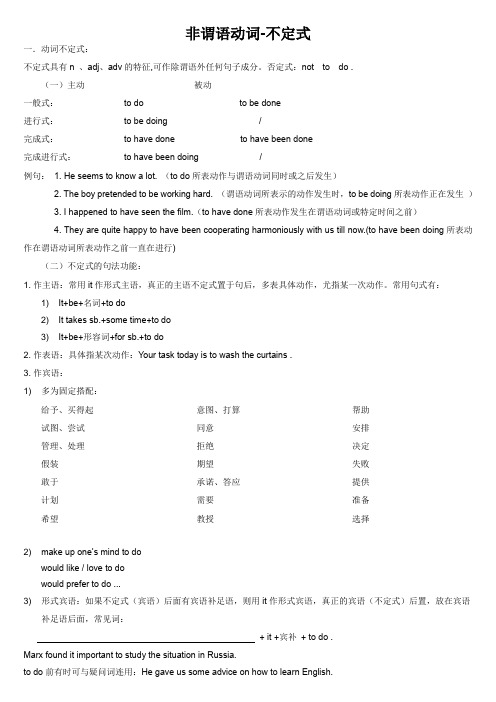
非谓语动词-不定式一.动词不定式:不定式具有n 、adj、adv的特征,可作除谓语外任何句子成分。
否定式:not to do .(一)主动被动一般式:to do to be done进行式:to be doing /完成式:to have done to have been done完成进行式:to have been doing /例句:1. He seems to know a lot. (to do所表动作与谓语动词同时或之后发生)2. The boy pretended to be working hard. (谓语动词所表示的动作发生时,to be doing所表动作正在发生)3. I happened to have seen the film.(to have done所表动作发生在谓语动词或特定时间之前)4. They are quite happy to have been cooperating harmoniously with us till now.(to have been doing所表动作在谓语动词所表动作之前一直在进行)(二)不定式的句法功能:1. 作主语:常用it作形式主语,真正的主语不定式置于句后,多表具体动作,尤指某一次动作。
常用句式有:1) It+be+名词+to do2) It takes sb.+some time+to do3) It+be+形容词+for sb.+to do2. 作表语:具体指某次动作:Your task today is to wash the curtains .3. 作宾语:1) 多为固定搭配:给予、买得起试图、尝试管理、处理假装敢于计划希望意图、打算同意拒绝期望承诺、答应需要教授帮助安排决定失败提供准备选择2) make up one’s mind to dowould like / love to dowould prefer to do ...3) 形式宾语:如果不定式(宾语)后面有宾语补足语,则用it作形式宾语,真正的宾语(不定式)后置,放在宾语补足语后面,常见词:+ it +宾补+ to do .Marx found it important to study the situation in Russia.to do前有时可与疑问词连用:He gave us some advice on how to learn English.4) 句型:过去常做不得不做应该做愿意做准备、愿意做be sure / glad / happy / afraid +to do be sorry / anxious / eager +to do5) 省略to 的句型:为什么不做?不能做只能做最好做宁愿做而不做4. 作补语:1) 在复合宾语中,动词不定式可充当宾语补足语,如下动词常跟这种复合宾语:want wishasktellorder beg permit help advise persuade allowpreparecauseforcecall onwait forinviteencourageexpectforbidgetintendlikelovepreferremindrequireteachwarndepend on此外,介词有时也与这种复合宾语连用,如:With a lot of work to do, he didn't go to the cinema.2) 有些动词如make, let, see, watch, hear, feel, have等与不带有to的不定式连用,但改为被动语态时,不定式要加to (主动省略to 被动还原to):I saw him cross the road.He was seen to cross the road.※五看:三让:二听:一感觉:3) 作主语补足语的句型:said reportedsb + be believed considered + to be doneknown found to have been donesupposed thoughtIt is said that he has gone abroad .= He is said to have gone abroad .He was later discovered to have been a spy.4)thinkconsiderbelievesupposefeel ...+ to be 作宾语补足语或主语补足语findimagineproveappointjudge 例:People considered him to be a great leader .He imagines himself to be an able man .5. 作定语:1) 若不定式所修饰词是不定式的地点、工具,不定式后要有相应介词:He didn’t have a house to live in . 若修饰的词为:time、way、place,不定式后省略介词: He didn’t have place to live .2) 若不定式作定语与所修饰词形成被动关系(动宾关系),可用to do 也可用to be done :Have you got anything to send ? (执行者为句子主语)to be sent ? (执行者是其他人)3) 用不定式作定语的情况:①表将来:The car to be bought is for his sister .②修饰被序数词、最高级或no ,all ,any 限定的中心词且为主动关系:He was the best man to do the job .③用来修饰抽象名词:能力机会主意事实借口承诺答案回复企图信仰方式理由时刻时光☆某些名词的同根词常跟to do ,因而也跟to do ,如:计划提议决定拒绝失败警告焦虑渴望愿望准备就绪例:我没有去观光的机会我不相信他会来访的承诺他没有去那里的计划他没有计划去那里6.作状语:1) 目的状语:He worked day and night to get the money. 若强调目的性,也可加in order to (可在句首)/ so as to(只在句中),此两结构在剧中时,不用都好隔开。
第六章 非谓语动词之不定式

6.---What do you think of the school? ----It is a very good school__________. to study in 你认为这学校怎么样? 是一所学习的好学校。
9.不定式的时态与语态: go out (go out). 1.I saw him_______ 2.I plan to attend the meeting__________ to be held (hold) tomorrow to be sleeping (sleep)when I 3.He pretended ____________ came in. 4.I’m sorry ____________ to have kept (keep) you waiting. 5.The article is said to _______________ have been read (read) by many people.
4. 不定式做定语
I have something to say. He has a lot of homework to do . He is looking for a room to live in . There is nothing to worry about.
注意: 1.不定式的逻辑主语是句子的主语时,不定式用主动 形式表被动。 2.如果作定语的不定式是一个短语,则要保留不定时 短语中的副词或介词。 我需要一支钢笔写字。 I need a pen to write with . 我有一个婴儿要照看 I have a little baby to look after .
非谓语动词不定式

非谓语动词--动词不定式(一)形式:1)I plan to attend the meeting.我计划参加这次会议。
2)I am sorry to have kept you waiting.很抱歉让你久等了。
3)They are said to be working hard.据说他们工作得很努力。
4)He is said to have been working in that factory for twelve years.据说他已在那家工厂工作12年了。
5)These clothes are to be washed as soon as possible.6)He is disappointed not to go swimming this afternoon.(二)用法1. To help each other is good.It is good to help each other_____________________________________________2. My job is to drive them to the power station every day.Our plan is to set up another middle school for the peasants’ children.To see is to believe.______________________________________________3. She wishes to be a musician.I am determined to give up smokingI don’t think it right to do it that way._____________________________________________4. Tell the children to play outside.I saw a little girl run across the street_________________________________5. Have you got anything to eat?But she gave up the chance to go abroad.Who was the last one to leave the classroom last night?Is this the best way to help him?__________________________________6. We went there to see our grandparents.I am very sorry to hear that.She hurried home only to find her father dead.To look at the picture, you would like it._____________________________________(三)句型1. It is very important for us to get everything ready for the harvest.It is very kind of you to help him every day._______________________________________________________________________________________________2.疑问词who,what,which,when,where和how后加不定式结构,它在句中可以用作主语、宾语、表语。
非谓语动词——动词不定式

校园英语 / 基础教育非谓语动词——动词不定式甘肃省白银市第八中学/魏立娟在英语中,不能作句子谓语,而是担任其他语法功能的动词,叫做非谓语动词。
非谓语动词有3种:动词不定式、动名词和分词。
现将动词不定式的用法总结如下:动词不定式的基本形式是“to+动词原形”,有时不能带to。
它没有人称和数的变化,在句子中不能作谓语,但它具有名词、形容词、副词的特征,在句子中可以作主语、宾语、宾语补足语、表语、定语和状语,它可以有自己的宾语和状语,并和其一起构成不定式短语,不定式的否定形式是在to前加not。
Please tell Tom to come here on time tomorrow.The doctor asked her not to eat too much meat.一、不定式作主语To keep the environment clean is our duty.在日常英语中,特别是当主语较长而谓语较短时,常用it作形式主语,而把真正的主语——动词不定式放在句子后面,避免头重脚轻。
It is good for our health to drink more water every day.二、不定式作宾语常用在及物动词 want,begin,decide,forget,hope,like,learn等的后面。
I want to buy a computer.He decided to give up smoking.不定式后面有宾语补足语时,可用先行词it作形式宾语,把真正的不定式宾语后置。
动词后能接复合宾语的有: think,find, believe, suppose, make等。
由于宾语和宾补有逻辑上的主谓关系,所以有时候将宾语和宾补换成从句的形式。
He found it difficult to learn English well.=He found that it’s difficult to learn English well.三、不定式作宾语补足语1.动词 ask,tell,want,teach,allow等后跟带to的动词不定式作宾补。
非谓语动词动词不定式

非谓语动词顾名思义,非谓语动词就是不能作谓语的动词。
包括:不定式、现在分词、过去分词和动名词。
不定式1.不定式的构成不定式是由不定式符号to+动词原形构成,在某些情况下to也可省略。
不定式一般有时态和语态的变化,通常有下表中的几种形式(以do为例):主动式被动式一般式to do to be done完成式to have done to have been done进行式to be doing /完成进行式to have been doing /1). 不定式的一般式不定式的一般式所表示的动作通常与主要谓语的动作同时或几乎同时发生,或是在它之后发生。
如:They invited us to go there this summer. 他们邀请我们今年夏天去那儿。
He stood aside for me to pass. 他站到一边让我通过。
2). 不定式的完成式不定式的完成式所表示的动作在谓语所表示的动作之前发生,它在句中可作表语、状语、宾语,有时也可作主语、定语等。
如:She seemed to have heard about this matter. 她似乎已听说过这件事。
I am sorry to have kept you waiting so long. 我很抱歉让你等了这么久。
I meant to have told you about it, but I happened to have an important thing to do.我本来想告诉你这件事的,但我碰巧有一件重要的事要做。
It has been an honor for me to have traveled so much in your country.对我来说,在你们国家旅行这么多地方是一件很荣幸的事情。
3). 不定式的进行式不定式的进行式表示正在进行的与谓语动词同时发生的动作。
它在句中可以用作除谓语以外的所有成分。
非谓语动词--动词不定式
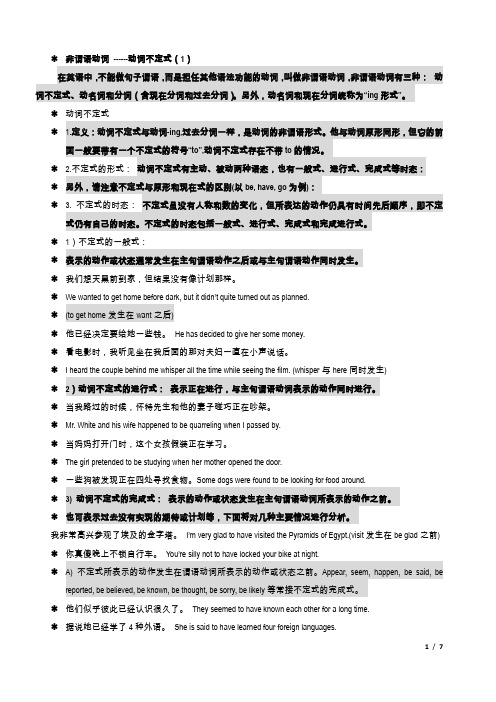
←非谓语动词------动词不定式(1)在英语中,不能做句子谓语,而是担任其他语法功能的动词,叫做非谓语动词,非谓语动词有三种:动词不定式、动名词和分词(含现在分词和过去分词)。
另外,动名词和现在分词统称为“ing形式”。
←动词不定式←1.定义:动词不定式与动词-ing,过去分词一样,是动词的非谓语形式。
他与动词原形同形,但它的前面一般要带有一个不定式的符号“to”,动词不定式存在不带to的情况。
← 2.不定式的形式:动词不定式有主动、被动两种语态,也有一般式、进行式、完成式等时态:←另外,请注意不定式与原形和现在式的区别(以be, have, go为例):← 3. 不定式的时态:不定式虽没有人称和数的变化,但所表达的动作仍具有时间先后顺序,即不定式仍有自己的时态。
不定式的时态包括一般式、进行式、完成式和完成进行式。
←1)不定式的一般式:←表示的动作或状态通常发生在主句谓语动作之后或与主句谓语动作同时发生。
←我们想天黑前到家,但结果没有像计划那样。
←We wanted to get home before dark, but it didn’t quite turned out as planned.←(to get home发生在want之后)←他已经决定要给她一些钱。
He has decided to give her some money.←看电影时,我听见坐在我后面的那对夫妇一直在小声说话。
←I heard the couple behind me whisper all the time while seeing the film. (whisper与here同时发生)←2)动词不定式的进行式:表示正在进行,与主句谓语动词表示的动作同时进行。
←当我路过的时候,怀特先生和他的妻子碰巧正在吵架。
←Mr. White and his wife happened to be quarreling when I passed by.←当妈妈打开门时,这个女孩假装正在学习。
非谓语动词-不定式

非谓语动词-不定式(Infinitive)学习非谓语动词要掌握两个概念:A.非限定动词的动作意义;B.非限定动词的形式。
任何一个动词都可能有不同形式的非限定动词的形式;但是无论这个动词写成哪一种非限定动词形式,它表示的意义是不会改变的。
那么在决定使用它的哪一种形式之前,我们必须首先判断它或者与它构成的短语在句中的语法成分;再根据它在这种特定语言环境中的意义去决定它的恰当形式。
1.掌握几种非限定动词形式之间的主要区别。
非限定动词的形式主要有三种:不定式、分词和动名词。
有时,这三种形式都可以充当同一个句子成分,如:它们都可以作定语、表语,又如:不定式和动名词都可以作主语、宾语;不定式和分词都可以作状语、宾语补足语,等等。
即使是同一种非限定动词形式,各自也有不同的形式,如:主动式、被动式;一般式、进行式、完成式,等等。
因此,不了解这些非限定动词形式之间的主要区别,就无法正确使用非限定动词。
当然这些区别中,有些是因为语言规则和习惯确定的;但很多却是由于意义和逻辑而决定的.2.着眼于意义,使用正确的非限定动词形式。
着眼于意义的作用在于,去解决那些由于意义和逻辑而决定的区别问题。
如上所述,在决定使用一个动词的哪一种非限定动词形式之前,我们必须首先判断它或者与它构成的短语在句中的语法成分;再根据它在这种特定语言环境中的意义去看它与其相关词所构成的关系;经过对这种关系的分析后,就可以决定它的非限定动词形式了。
用所给动词的恰当形式完成下面各句:1)She wanted the work_____(complete)by Friday.2)She wanted us_____(complete)the wok by Friday.3)We extended a warm welcome to his_____(come)to our party.4)She looked_____(disappoint)after she lost the game.1)She wanted the work to be completed by Friday2)She wanted us to complete the wok by Friday.3)We extended a warm welcome to his coming to our party.我们对他来参加我们的聚会表示了热情的欢迎。
非谓语动词(不定式)
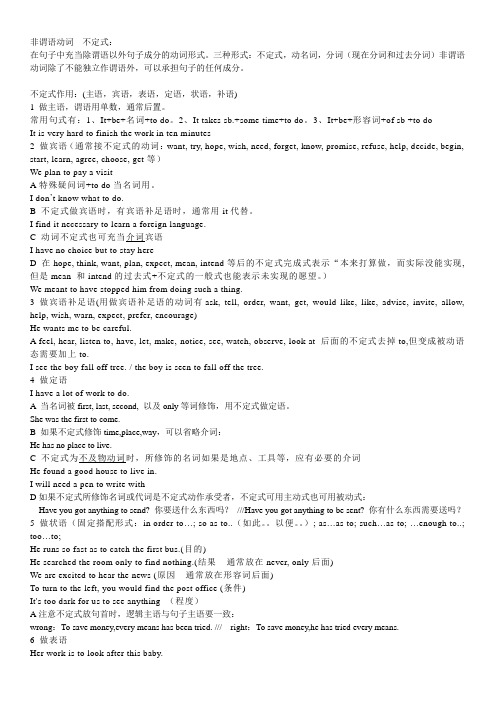
非谓语动词---不定式:在句子中充当除谓语以外句子成分的动词形式。
三种形式:不定式,动名词,分词(现在分词和过去分词)非谓语动词除了不能独立作谓语外,可以承担句子的任何成分。
不定式作用:(主语,宾语,表语,定语,状语,补语)1 做主语,谓语用单数,通常后置。
常用句式有:1、It+be+名词+to do。
2、It takes sb.+some time+to do。
3、It+be+形容词+of sb +to doIt is very hard to finish the work in ten m inutes2 做宾语(通常接不定式的动词:want, try, hope, w ish, need, forget, know, promise, refuse, help, dec ide, begin, start, learn, agree, choose, get等)We plan to pay a visitA特殊疑问词+to do当名词用。
I don’t know what to do.B 不定式做宾语时,有宾语补足语时,通常用it代替。
I find it nec essary to learn a foreign language.C 动词不定式也可充当介词宾语I have no choic e but to stay hereD 在hope, think, w ant, plan, expect, mean, intend等后的不定式完成式表示“本来打算做,而实际没能实现, 但是mean 和intend的过去式+不定式的一般式也能表示未实现的愿望。
)We meant to have stopped him from doing suc h a thing.3 做宾语补足语(用做宾语补足语的动词有ask, tell, order, w ant, get, would like, like, advise, invite, allow, help, w ish, warn, expect, prefer, enc ourage)He w ants me to be c areful.A feel, hear, listen to, have, let, make, notic e, see, w atc h, observe, look at 后面的不定式去掉to,但变成被动语态需要加上to.I see the boy fall off tree. / the boy is seen to fall off the tree.4 做定语I have a lot of work to do.A当名词被first, last, second, 以及only等词修饰,用不定式做定语。
非谓语动词-动词不定式

注:在it先行词作主语的句型中,常用for sb. 或of sb. 作 不定式的逻辑主语。
1. 如果说明不定式短语是由谁做的,则在不定式前加for sb.常用形 容词有:difficult, easy, important, necessary, interesting, (im)possible等。 It is important for us to express our feelings. 对于我们来说,表达我们的情感是很重要的。 It is difficult for us to finish the work in such a short time. 对于我们来说,在这么短的时间完成这项工作是困难的。
He has a lot of books to read. 他有许多书要读。
He is looking for a room to live in.
他正在找一间房子住。
1. 我有一些话说。 I have something to say.
2. 今天早上我什么也没吃。 I had nothing to eat this morning.
作宾补 在动词后用不定式作宾补。
1. 大多数及物动词后要用不定式作宾补。这类的动词: ask, want, invite, help, expect, prefer, tell, allow, advise, require等 (及物动词+sb.+to do sth)
She wants Tom to tell her truth. 她想让Tom告诉她真相。
I'm glad to see you.
英语语法知识难点---非谓语动词之不定式
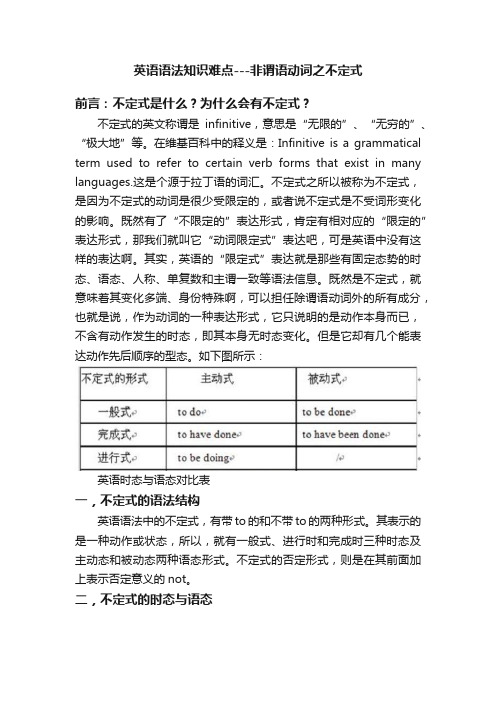
英语语法知识难点---非谓语动词之不定式前言:不定式是什么?为什么会有不定式?不定式的英文称谓是infinitive,意思是“无限的”、“无穷的”、“极大地”等。
在维基百科中的释义是:Infinitive is a grammatical term used to refer to certain verb forms that exist in many languages.这是个源于拉丁语的词汇。
不定式之所以被称为不定式,是因为不定式的动词是很少受限定的,或者说不定式是不受词形变化的影响。
既然有了“不限定的”表达形式,肯定有相对应的“限定的”表达形式,那我们就叫它“动词限定式”表达吧,可是英语中没有这样的表达啊。
其实,英语的“限定式”表达就是那些有固定态势的时态、语态、人称、单复数和主谓一致等语法信息。
既然是不定式,就意味着其变化多端、身份特殊啊,可以担任除谓语动词外的所有成分,也就是说,作为动词的一种表达形式,它只说明的是动作本身而已,不含有动作发生的时态,即其本身无时态变化。
但是它却有几个能表达动作先后顺序的型态。
如下图所示:英语时态与语态对比表一,不定式的语法结构英语语法中的不定式,有带to的和不带to的两种形式。
其表示的是一种动作或状态,所以,就有一般式、进行时和完成时三种时态及主动态和被动态两种语态形式。
不定式的否定形式,则是在其前面加上表示否定意义的not。
二,不定式的时态与语态英语时态与语态对比表不定式的一般式表示的动作与谓语动词的动作无时间上的先后顺序;不定时的完成式表示的动作一般发生在谓语动词前,强调动作的先后顺序;不定式的进行时表示的动作一般与谓语动词同时进行。
例句:I hope to finish reading the noval today. 我希望今天读完这本小说。
You seem to have travelled many times. 你好像旅行过很多次了。
非谓语动词--不定式(高中英语考点分析+精讲精练)

动词不定式考点一:不定式的时态和语态大多数情况下不定式以一般式形式出现,但在高考试题中往往会出现时态、语态的形式,如进行式、完成式、被动式等。
1.①----Is Bob still performing?----I'm afraid not.He is said________the stage already as he has become an officialA.to have leftB.to leaveC.to have been leftD.to be left②Police are now searching for a woman who is reported to____since the flood hit the area last Friday.A.have been missingB.have got lostC.be missingD.get lost③The crowd cheered wildly at the sight of Liu Xiang,who was reported______the world record in the110-meterhurdle race.A.breakingB.having brokenC.to have brokenD.break2.①The news reporters hurried to the airport,only____the film stars had left.A.to tellB.to be toldC.tellingD.told②He hurried to the station only____that the train had left.A.to have foundB.findingC.foundD.to find③He hurried to the booking office only________that all the tickets had been sold out.A.to tellB.to be toldC.tellingD.told3.①As the twentieth century came to a close,the raw materials for a great national literature were athand,waiting___________.A.to useB.to be usedC.to have usedD.to be using②It took a long time for the connection between body temperature and illness______.A.to make B.to be made C.making D.being made③The Chinese are proud of the29th Olympic Games______in Beijing in2010.A.holdB.holdingC.heldD.to be held④It remains________whether Jim’ll be fit enough to play in the finals.A.seenB.to be seenC.seeingD.to see⑤When asked why he went there,he said he was sent there for a space flight.A.trainingB.being trainedC.to have trainedD.to be trained⑥The children talked so loudly at dinner table that I had to struggle______.A.to be heardB.to have heardC.hearingD.being heard考点二:不定式的功能不定式是非谓语动词常见的一种形式,它具有名词的特征,在句子中可以作主语或宾语;具有形容词的特征,在句子中可以作表语、定语或补足语;具有副词的特征,在句子中可以作状语。
非谓语动词不定式

非谓语动词在英语中,不单独作句子谓语的动词,叫做非谓语动词,除了不能作谓语,可以其他成分。
to do 不定式非谓语动词doing 分词;动名词done 过去分词To do 用法:1. 做主语:不定式作主语时,谓语用单数To do such things is foolish.To learn English well is not easy.当主语较长,谓语较短时,常用it做形式主语,将不定式放到谓语的后面。
It is foolish to do such things.It is not easy to learn English well.2.做表语:His hope is to go to a key university.My dream is to be admitted by a key university.3.作宾语:They learned to drive all kinds of cars.I decided to be a doctor when i was young.4.做定语:There are some problems to solve.The last one to arrive will be punished.5.宾语补足语:(1) v+sb+to doThe teacher asked me to clean the room.The government called on the people to fight against air pollution.6. 做状语: .To learn a foreign language well, you must try your best.His mother did all to help him study abroad.填空1 .My mother promised ________(buy) a gift for me.2 .He worked day and night _________(get) the money.3 .He is the first person _______(think) of the idea.4 .They were very sad _______( hear) the news.5.______ is a pleasure to play with you.6.______( learn) a foreign language well, you must try your best.7.The teacher asked the student _______(wipe) the blackboard.8.My dream is ________(become ) a scientist.。
- 1、下载文档前请自行甄别文档内容的完整性,平台不提供额外的编辑、内容补充、找答案等附加服务。
- 2、"仅部分预览"的文档,不可在线预览部分如存在完整性等问题,可反馈申请退款(可完整预览的文档不适用该条件!)。
- 3、如文档侵犯您的权益,请联系客服反馈,我们会尽快为您处理(人工客服工作时间:9:00-18:30)。
非谓语动词非谓语动词有动词不定式(the Infinitive);动名词(the Gerund);现在分词(the Present Participle);过去分词(the Past Participle)不定式由“to+动词原形”构成,其否定形式是“not to+动词原形”。
不定式可以带宾语或状语构成不定式短语,没有人称和数的变化,但有时态和语态的变化。
不定式可作主语、宾语、状语、表语和定语,但不能单独作谓语。
1)作主语:To finish the work in ten minutes is very hard.动词不定式短语作主语时,常用it作形式主语,例如上面一句可用如下形式:It is very hard to finish the work in ten minutes.2)作表语:Her job is to clean the hall.3)作宾语:常与不定式作宾语连用的动词有:want, hope, wish, offer, fail, plan, learn, pretend, refuse, manage, help, agree, promise, prefer,afford,ask,decide,expect,intend,等。
如果不定式(宾语)后面有宾语补足语,则用it作形式宾语,真正的宾语(不定式)后置,放在宾语补足语后面,如:Marx found it important to study the situation in Russia.介词but后通常要接动词不定式to。
如果but之前有行为动词do的各种形式,那么这些介词后的不定式不带to(前有do,后无to)。
I have no choice but to stay here.另外在can’t choose but和can’t help but等后面的不定式也省略to。
如:4)作宾语补足语:动词不定式作动词feel,hear,see,watch,notice,observe等感官动词以及have,let,make 等使役动词后面的宾语补足语时,不定式符号to要省略。
但如果这些句子变成被动结构时,就必须带to符号。
如:I saw him cross the road.我看到他过了街道。
He was seen to cross the road.他被看到过了街道。
5)作定语:作定语的不定式如果是不及物动词,或者不定式修饰的名词或代词是不定式动作的地点(place除外)(in,at)、工具(by,with)等,不定式后面须有相应的介词。
如:There is nothing to worry about.This is a good house to live in.如果不定式修饰time, place, way,可以省略介词:He has no place to live.This is the best way to work out this problem.当作定语的不定式所修饰的名词或代词是不定式动作的承受者时,不定式既可以用主动语态,也可用被动语态,但其含义有所不同。
试比较:Have you got anything to send ?(你有什么东西要寄吗?——不定式to send的动作执行者是“你”)Have you got anything to be sent ?(你有什么要(我或别人)寄的东西吗?——不定式to be sent的动作执行者是“我”或“别人”)用不定式作定语的几种常见情况:①不定式表将来I borrowed some books to read during my holiday.②用来修饰被序数词、最高级或no,all,any等限定的中心词。
如:He was the best man to do the job.She was the first woman to win the gold medal in the Olympic Games.③用于修饰的词是抽象名词时,常见的有:ability,chance,idea,fact,excuse,promise,answer,reply,attempt,belief,way,reason,moment,time等。
如:Do you have the ability to read and write English?6)作状语表目的He worked day and night to get the money.为了挣钱,他日日夜夜的工作。
表结果(意料之外的结果)常用only放在不定式前表示强调:I visited him only to find him out.我来拜访他,结果发现他出去了。
表原因They were very sad to hear the news.听到这个消息他们非常伤心。
表程度It’s too dark for us to see anything.天太黑了,我们什么也看不清。
作独立成分To tell you the truth, I don’t like the way he talked.说实话,我不喜欢他说话的方式。
3.不定式符号to的保留问题有时为了避免重复,可以用to来代替前面的不定式,这种情况常出现在下列动词后:expect,hope,wish,mean,prefer,care,forget,want,try以及be glad/happy;would like/love等后面。
如:I haven’t been to Hong Kong,but I wish to. 我没去过香港,但我想去。
4.动词不定式的几种特殊结构1)for sb.to do 还是of sb.to do“for+逻辑主语+不定式”结构称为不定式复合结构,介词可用for或of。
当形式主语句型中的表语是形容词,来描述不定式动作时,逻辑主语之前使用for(It’s easy for her to clean the window by herself.It’s important for us to learn English well.);当它描述不定式的逻辑主语,说明其品质、特征或属性时,要用of,常见形容词有good,nice,clever,wise,foolish,stupid,honest,kind,polite,careful,cruel,brave,crazy等(It’s clever of you to answer the question so quickly./ It’s kind of you to help me a lot.)。
2)too ... to结构在英语中,“too+adj./adv.+to do sth.”结构表示否定意义,意为“太……而不能……”。
He is too young to study.也可用so...that句型来表示,但that从句必须用否定形式。
如:You’re too young to understand such things.你太小了,还不能理解那些事情。
=You’re so yong that you can’t understand such things.注意:在下列场合下,too... to结构表示肯定意义:某些形容词与too...to 连用表示肯定意义,too相当于very much。
这些形容词多是表示心情的词和描述性的形容词。
如:ready,glad,pleased,surprised,delighted,happy,easy,eager,thankful,anxious,willing,good,kind,true等。
too前经常加上only,but,all,simply或just。
如:I’m only too glad to meet you here again.再次见到你我太高兴了。
【2013 上海】47. Even Tony’s granddaughter, a five-year-old girl, asked him ________smoking.A. give upB. gave upC. to give upD. giving up【2013湖南益阳】35. He used to _____in a small village, but now he has been used to ____in a big city.A. live; livingB. live; liveC. living; living【2013湖南益阳】28.You look too tired. Why not______a rest?A. stop to haveB. to stop havingC. stop having【2013湖北十堰】33. How kind you are! You always do what you can __________ others.A. helpB. helpingC. helpsD. to help【2013湖北孝感】33. —What a heavy rain!—So it is. I prefer ______ rather than ____ on such a rainy day.A. to go out; stay at homeB. to stay at home; go outC. going out; stay at homeD. staying at home ; go out【2013天津】30. He promised ______his old friend during his stay in Tianjin.A. seeB. seeingC. sawD. to see【2013陕西】23. Mary called and asked her husband ________home at once , because she locked their daughter in the home .A. to leaveB. leaveC. goD. to go【2013黑龙江齐齐哈尔】30. The boy is often heard in the music room. He sings very well.A. practice singingB. to practice singingC. practiced singing【2013河北】39. The children decide_ their school yard this Friday afternoon.A. cleanB. to cleanC. cleaningD. cleaned【2013 甘肃白银】57. ——George was heard _______ just now. What happened?——People was telling a joke.A. to cryB. cryC. to laughD. laugh【2013 甘肃白银】59. The little boy pretended _______ when his mother came in.A. sleepingB. asleepC. to asleepD. to be asleep【2013 甘肃白银】39. I haven’t decided when ________ a holiday yet.A. tookB. takingC. to take D take。
